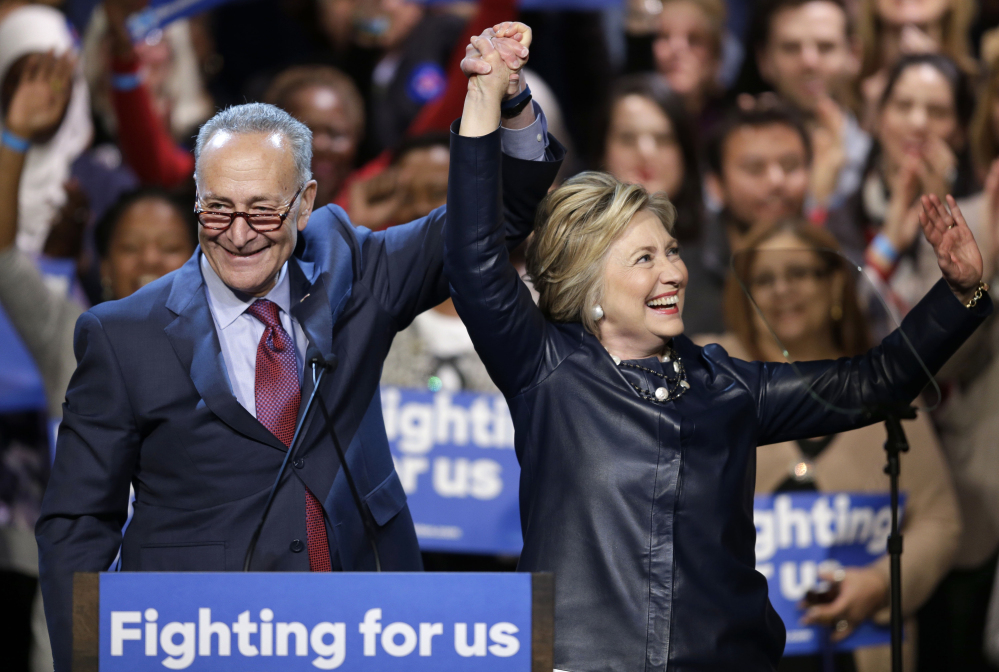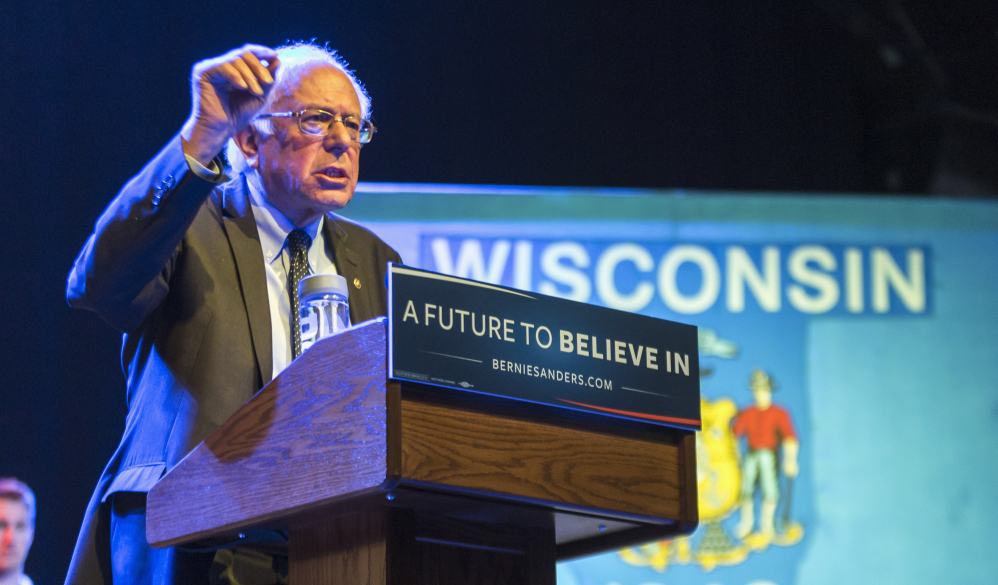MILWAUKEE – Hillary Clinton’s campaign aims to effectively end the Democratic primaries against Bernie Sanders by early May. But first she needs to navigate tricky contests in Wisconsin and her home state of New York.
Clinton enters April with a big delegate lead and insider support among Democrats crucial to the nomination. But Sanders is pointing to victories in five of the past six states holding contests – among them, three western states – and views Wisconsin as a home for the progressive causes he has long supported.
“We are on a roll. Our campaign has momentum,” Sanders told a crowd of about 4,000 Tuesday night inside the Wisconsin State Fair Park Products Pavilion in Milwaukee.
A win by Sanders here next Tuesday would put pressure on Clinton to deliver in New York, which she represented in the Senate. Returning to New York before the state’s April 19 primary, Clinton campaigned at Harlem’s famed Apollo Theater and unveiled a new television ad taking on Republican Donald Trump’s hardline immigration policies and violence at some of his rallies.
Wisconsin, with its mix of urban and rural voters, could offer parallels to its Midwestern neighbors. Sanders’ triumph in Michigan earlier this month was one of the biggest moments of his campaign but Clinton defeated him a week later in Illinois and Ohio, setting up a new fight.
SANDERS ATTACKS TRADE POLICIES
Sanders, reprising a message he used effectively against Clinton in Michigan, said disastrous trade policies led to the 1996 loss of Milwaukee’s Johnson Controls plant to Mexico and the closure of Janesville’s General Motors plant in 2008.
In a play for Democrats’ hearts, Clinton has slammed Republican Gov. Scott Walker, a former presidential candidate who rose to prominence through his fights with organized labor.
Clinton accuses Walker of “taking a wrecking ball” to the rights of workers and women. She also puts Walker at the center of her critique of Sanders’ plan to provide free tuition at public colleges and universities, saying it relies too heavily on governors kicking in funding.
Sanders, who advocates for large voter turnout at every turn, has lashed out against Wisconsin’s voter identification, faulting Walker with making it harder for people to vote.
Sanders, despite the wins in Washington state, Alaska and elsewhere, still faces significant hurdles. Clinton has won 1,243 pledged delegates compared to Sanders’ 980, according to a count by The Associated Press.
Clinton’s lead grows when including superdelegates, or party officials like members of Congress and state leaders who can back any candidate they wish. Including superdelegates, Clinton has 1,712 delegates to Sanders’ 1,011. It takes 2,383 to win and Clinton’s team has suggested April 26 primaries in Pennsylvania, Maryland, Connecticut, Rhode Island and Delaware as a time when it could essentially seal the nomination.
NEW CAUSE FOR CONCERN
Then-Illinois Sen. Barack Obama defeated Clinton handily in Wisconsin’s primary in 2008. Her team has suggested that either a narrow victory or loss would not have a major influence on the overall delegate count.
And there’s new cause for concern. A new opinion poll from Marquette University shows 49 percent of likely Democratic primary voters in Wisconsin support Sanders, compared to 45 percent for Clinton. About 6 percent of respondents were undecided. The results are within the survey’s margin of error.
In New York, both candidates are preparing for a drag-out fight in a state where both have roots.
At a rally in New York’s iconic Harlem neighborhood Wednesday, Clinton sought to emphasize her differences with Sanders while touting her home state advantage.
“My opponent says, well, we’re just not thinking big enough,” she told supporters. “Well, this is New York. Nobody dreams bigger than we do. But this is a city that likes to get things done. And that’s what we want from our president too.”
Sanders, who grew up in Brooklyn, aims to build a coalition of liberal voters in New York City and economically-frustrated areas upstate, which has suffered as manufacturing jobs have declined.
He’s also planning to highlight his strong opposition to fracking, an oil-and-gas extraction method that New York State was the first to ban.
CLINTON TO HIGHLIGHT RECORD
Clinton, meanwhile, plans to highlight her record as senator, particular her economic work upstate and aid to 9/11 first responders.
Sanders is “going to campaign like a Brooklynite and she’s going to campaign like a senator who represented this state for eight years and has lived here for 16,” said her senior strategist Joel Benenson. “It may be competitive but he’s not going to get a number in New York that’s going to change the delegate count materially.”
But Clinton’s history in New York raises the stakes – win or lose.
“If it’s even close, Secretary Clinton will have a whole other set of problems,” said Democratic strategist Hank Sheinkopf, a New York-based consultant to President Bill Clinton’s 1996 re-election campaign. “Republicans will think it’s a great day and Democrats will freak out.”
Associated Press writers Lisa Lerer, Catherine Lucey and Jonathan Lemire in New York and Greg Moore in Milwaukee contributed to this report.
Send questions/comments to the editors.



